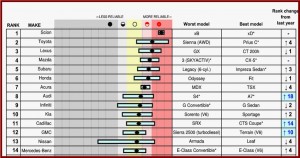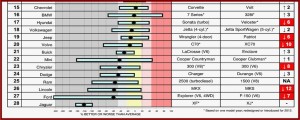
CR has a pretty good record – 85% of the 2012 models predicted to have average or batter than average reliability last year, actually came in that way this year. CR still does not recommend by a new or substantially revised model in its first year.
Toyota Motor Corporation’s three brands – Scion, Toyota, and Lexus took the highest places in the latest reliability survey released today at the Automotive Press Association in Detroit. The Toyota brands were followed by four other Japanese makes: Mazda, Subaru, Honda, and Acura, respectively. All of the models produced by the top seven Japanese brands had average or better reliability according to Consumer Reports, based on a survey of 800,000 owners who reported on 1.2 million vehicles up to ten years old. Of the 90 Japanese models reflected in the Consumer Reports brand comparison, 86 were average or better, with 35 earning the highest rating.
Toyota dominated the Consumer Reports 2012 Annual Auto Reliability Survey, the largest survey of its kind. Of the 27 models in the brand’s lineup, 16 earned the highest rating. The subcompact Toyota Prius C – a vehicle Consumer Reports panned in a road test – earned the highest score overall. The hatchback Prius, the larger Prius V, and the new Prius plug-in were also above average.
At the other end of the rankings, Jaguar was last, Ford to next to last and Lincoln third to last among the 28 car brands rated.
“Ford’s bumpy road can be seen in the numbers. Sixty percent of Ford-branded models and half of Lincolns were below average in predicted reliability, and none placed above average,” said Jake Fisher, director of automotive testing for Consumer Reports, who replaced David Champion who left CR for Nissan. (Consumer Reports Auto Tester David Champion Joins Nissan)
Ford’s 7-place drop and Lincoln’s 12-place dive compared to last year was attributed to various factors. A few new or redesigned models, including Explorer, Fiesta, and Focus, launched with more problems than normal. Ford has also added the MyFord, MyLincoln Touch electronic infotainment system to many vehicles, which has been “problematic.” (Ford, Lincoln Change Touch Screens after Quality Ratings Dive)
Moreover, three historically reliable models because of long production runs —the Ford Escape, Fusion and the Lincoln MKZ—are not included in the analysis since they were redesigned for 2013 and CR doesn’t yet have reliability data on them.
Cadillac is the top U.S. brand, having moved up 14 spots this year. Its CTS coupe was the most reliable domestic car. A number of other General Motors nameplates—Buick, Chevrolet, GMC—also moved up in the ranking. The Chevrolet Volt extended-range electric car continues to have above-average reliability, and the compact Chevrolet Cruze, “dismal” in its first year, improved to average. Part of the reason is because GM vehicles – like most domestic vehicles – have poor records in their first couple of years until automakers work the problems out.
This year, there was enough data to report on some of the recently revised Chrysler and Dodge models, and their problems dragged the nameplates’ rankings down. The Dodge Charger, for example, returns with well-below-average reliability. Other models varied. TheV6 version of the Chrysler 300 sedan, with an average rating, is now the brand’s most reliable model, and the V8 300 is its worst. Likewise, the V6 Jeep Grand Cherokee scores average and the V8 is now below average. CR thinks the differences stem from the alternative powertrains and the extra features found in higher-priced versions. Separating its trucks into a new nameplate, Ram, did not help Dodge’s standing. Fiat’s 500 debuted with average reliability in its first year in the U.S.
All of the German luxury brands improved. Six of the seven Audis in CR’s survey rated average or better, as did 10 of the 12 BMWs. However, the high-end BMW 7 Series and the turbocharged six-cylinder version of the X3 SUV were much worse than average. Mercedes-Benz had a mixed good showing, with the turbocharged, four-cylinder C250 sedan doing well in its first year and the V6 E-Class sedan moving from average to above average. However, the redesigned M-Class came in below average in its first year.
The redesigned Volkswagen Passat did well, and the CC, Eos, and diesel Jetta sedan improved. Nevertheless, the redesigned Beetle, four- and five-cylinder gasoline Jetta, GTI, and Touareg SUV were below average. Volvo, which ranked highest among European brands last year, dropped 10 places, hurt by declining scores for the C30 hatchback and C70 convertible and a below-average showing for the aging XC90 SUV.
CR bases its predicted-reliability scores on the most recent three model years of data, provided the model has not been redesigned for 2013. The scores are presented as a percentage better or worse than the average of all cars. Minimum sample size is 100 vehicles, but Consumer Reports often gets many more. Among 2012 models, the Honda CR-V drew the most responses: 2,981. Other 2012 models with more than 2,000 responses are the Hyundai Elantra sedan and the four-cylinder Toyota Camry and Subaru Outback. Some new and redesigned models were released too late to be in our survey, and redesigned 2013 models are not included in the brand’s average reliability score.
The complete report and rankings are available at www.ConsumerReports.org See last year’s story here: Chrysler Up, GM Sideways, Ford Down in Consumer Reports Annual Reliability Survey Revealed Today at APA in Detroit


